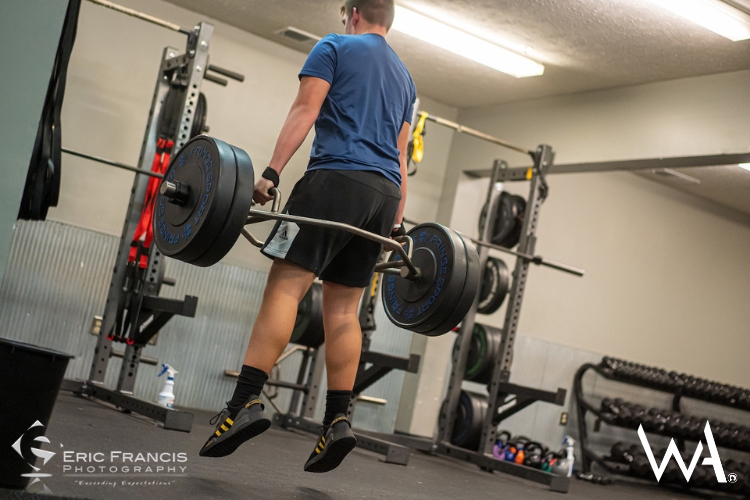
The role of carbohydrates in post-workout recovery
Other Blogs
-
10/22/2025 10:11 PM
Empowering Female Athletes. Youth Basketball & Soccer Performance in Omaha
-
10/22/2025 9:57 PM
High School Football Playoffs: Mental Preparation Tips | Warren Academy Omaha
-
10/30/2024 1:58 PM
Breaking Down Plyometric Training: How to Build Explosive Power for Football
-
10/23/2024 12:00 PM
Offseason Training: Why Speed And Agility Matters
-
10/16/2024 12:05 PM
Functional Strength: Why Athletes Need More Than Just Lifting Weights
-
10/9/2024 12:07 PM
The Role of Flexibility in Sports: Why It’s Key to Preventing Injuries
-
10/2/2024 12:09 PM
Preventing Burnout In High School Athletes
-
9/11/2024 1:34 PM
Injury Prevention 101: Keeping Football Athletes Safe and Healthy During the Season
-
8/28/2024 2:35 PM
Stability Training: What It Is & Why It’s Beneficial
-
8/14/2024 12:16 PM
Injury Prevention Strategies for High School Football Players
-
8/7/2024 10:15 AM
In-Season Recovery Tips
-
7/31/2024 12:10 PM
Why In-Season Strength Training Is Crucial For Football Athletes
-
7/24/2024 1:24 PM
Developing Leadership Skills: Becoming a Leader On and Off the Field
-
7/17/2024 12:37 PM
Athlete Qualities That Make You GREAT
-
7/10/2024 12:03 PM
Benefits Of Playing Multiple Sports In High School
-
7/3/2024 11:51 AM
Fuel Your Body: Essential Tips For Athletes
-
6/19/2024 9:33 AM
Tips on building confidence on and off the field
-
6/12/2024 10:09 AM
Mobility vs Flexibility
-
6/5/2024 3:15 PM
Summer Training Essentials
-
5/29/2024 4:20 PM
Position-Specific Training: Tailoring Workouts for Football Players
-
5/22/2024 12:55 PM
Staying Motivated During Offseason Training
-
5/15/2024 1:52 PM
Functional Movement Training: Improving Mobility and Stability for Athletic Performance
-
5/1/2024 9:45 AM
Summer Training Essentials: Staying Active and Improving Skills During the Offseason
-
4/24/2024 1:05 PM
Preventing Injuries: Conditioning and Injury Prevention Drills for Running Backs
-
4/10/2024 12:34 PM
Acceleration vs Speed: Why athletes need both
-
4/3/2024 12:34 PM
The role of carbohydrates in post-workout recovery
-
3/27/2024 1:41 PM
Mental Toughness Training: Building Resilience In Young Athletes
-
3/20/2024 9:03 AM
Why Strength Training is Vital For Athlete Development
-
3/13/2024 7:52 AM
Offseason Injury Prevention: Ways To Keep Your Body Safe
-
2/28/2024 12:30 PM
Speed Development Strategies: Enhancing Athletic Performance for Football Players
-
2/28/2024 9:11 AM
Defensive Technique: Training Tips For D-Line, LBs and DBs
-
2/21/2024 12:45 PM
Maximizing Offseason Gains: A Guide for High School Football Players
-
2/14/2024 2:39 PM
Speed and Strength: The Cornerstone for Football Athletes
-
2/7/2024 12:17 PM
The Warren Academy Game Changer Program
-
1/24/2024 9:05 AM
Private Position Training At Warren Academy
-
1/17/2024 4:05 PM
Welcome To Our New Website!
-
2/1/2023 1:49 PM
Benefits of training as a team
-
1/25/2023 11:13 PM
Why Athletes Need Strength Training
-
1/18/2023 12:16 PM
Offseason Football Training Overview
-
1/11/2023 10:22 AM
Unsigned Senior & Top Prospects Showcases
-
1/4/2023 12:16 PM
Athlete New Year’s Goals
-
12/21/2022 11:33 AM
Stay Motivated This Offseason
-
12/14/2022 10:42 AM
College Showcase Tips
-
12/7/2022 11:54 AM
The Benefits Of Speed And Agility Training For Young Athletes
-
11/30/2022 12:23 PM
Importance Of A Strong Core
-
11/17/2022 3:15 PM
Advantages Of Playing Multiple Sports
-
11/11/2022 1:30 PM
Setting Athlete Goals
-
11/3/2022 2:59 PM
Start Your Offseason Off Stong
-
10/26/2022 12:40 PM
Qualities All Great Athletes Encompass
-
10/19/2022 11:23 AM
How Young Athletes Can Deal With Failure
-
10/5/2022 1:42 PM
Athlete Recovery Tips
-
9/21/2022 1:18 PM
Ways Athletes Can Stay Confident In Themselves
-
8/25/2022 8:26 AM
The Importance Of Athlete Stretching
-
8/18/2022 11:43 AM
How To Be The Best Teammate
-
8/3/2022 11:52 AM
Managing Sports and School
-
7/27/2022 11:54 AM
How Athletes Can Make A Great First Impression
-
7/20/2022 12:15 PM
Qualities Of A Leader
-
7/6/2022 12:32 PM
The Benefits Of Being A Multi-Sport Athlete
-
6/29/2022 11:45 AM
Summer Agility Drills
-
6/22/2022 11:18 AM
Staying Motivated During Summer Training
-
6/1/2022 11:39 AM
Nutrition For Faster Injury Recovery
-
5/25/2022 12:16 PM
How Are You Preparing For Your Workouts?
-
5/18/2022 11:45 AM
Summer Training Tips
-
5/4/2022 11:33 AM
Why Core Strength Is Essential For Optimal Performance
-
4/20/2022 12:52 PM
The Benefits of Resistance Training for Athletes
-
4/6/2022 11:25 AM
Best Ways To Build Speed
-
3/23/2022 12:25 PM
Why Sport-Specific Training is Beneficial to Athletes
-
3/9/2022 12:32 PM
How To Tell When Your Are Overtraining
-
2/16/2022 11:50 AM
How To Manage Being A Multi-Sport Athlete
-
2/2/2022 4:12 PM
Athlete Recruiting Tips
-
1/19/2022 11:00 AM
Ways Athletes Can Build Strength
-
1/5/2022 11:24 AM
Ways To Stay Motivated And Focused During The Offseason
-
12/15/2021 11:51 AM
Ways To Improve Acceleration
-
12/1/2021 12:02 PM
UPDATED: Reasons To Play 7v7 During The Offseason
-
11/17/2021 11:19 AM
The Importance Of Attending Football Camps
-
11/3/2021 11:34 AM
How To Tackle Your Offseason
-
10/20/2021 10:58 AM
How Yoga Benefits Athletes
-
10/6/2021 10:34 AM
Recruiting Tips For High School Athletes
-
9/22/2021 2:11 PM
Athlete Tips: Dealing with failure
-
9/8/2021 10:44 AM
Benefits Of In-Season Training
-
8/25/2021 11:25 AM
How To Manage Your Time As A Student Athlete
-
8/11/2021 9:35 AM
How To Impress Coaches Early In The Season
-
7/14/2021 10:45 AM
Tips On Mentally Preparing For A New Season
-
6/30/2021 9:30 AM
Football Summer Agility Drills
-
6/16/2021 10:48 AM
Things Athletes Need In Order To Become Great
-
6/2/2021 10:25 AM
The Importance Of Good Nutrition When Injured
-
5/19/2021 10:48 AM
Tips On Staying Motivated Throughout The Summer
-
5/5/2021 10:59 AM
How Any Athlete Can Become A Great Leader
-
4/21/2021 10:51 AM
How Youth Sports Help Teach Life Skills
-
4/7/2021 10:51 AM
Benefits of Team Training
-
3/10/2021 10:43 AM
Ways To Be A Good Teammate
-
2/24/2021 10:40 AM
Mobility vs. Flexibility: What’s the Difference?
-
2/10/2021 10:35 AM
Benefits of Resistance Training
-
1/27/2021 9:28 AM
How to make yourself stand out at tryouts
-
1/13/2021 10:54 AM
College Recruiting Tips for Athletes
-
12/23/2020 11:03 AM
Benefits of Strength and Conditioning Programs
-
12/9/2020 10:56 AM
How Speed and Agility Training Benefits Athletes
-
11/25/2020 11:38 AM
Why stretching is important for every athlete
-
11/11/2020 10:39 AM
Benefits of Sport-Specific Training
-
10/28/2020 11:01 AM
Off-Season Training Tips
 https://www.omahamediagroup.com/images/uploads/monster_gallery/Omaha-Media-Group-Black.jpg
OMG Admin
https://www.omahamediagroup.com/images/uploads/monster_gallery/Omaha-Media-Group-Black.jpg
OMG Admin

After a hard workout and intense training, the body undergoes significant stress and depletion of energy storage. To replenish and recover effectively, athletes must pay close attention to their post-workout nutrition, with a particular focus on carbohydrates.
At Warren Academy, we offer premier offseason strength training programs in Omaha. In this blog, we go over the critical role of carbohydrates in post-workout recovery and provide essential athlete recovery tips to optimize performance and recovery.
Carbohydrates serve as the primary source of energy for the body, especially during high-intensity exercise. During exercise, the body breaks down glycogen, the stored form of carbohydrates in the muscles and liver, to fuel physical activity. As glycogen stores become depleted post-workout, replenishing them through carbohydrate consumption is crucial for restoring energy levels and promoting recovery.
One of the primary benefits of consuming carbohydrates post-workout is their role in replenishing glycogen stores. Carbohydrate consumption stimulates insulin release, which helps shuttle glucose into the muscles, where it is stored as glycogen. This replenishment of glycogen stores is essential for supporting muscle recovery and ensuring optimal performance in subsequent training sessions or competitions.
In addition to replenishing glycogen stores, carbohydrates also play a vital role in promoting protein synthesis and muscle repair. Consuming carbohydrates post-workout helps create an insulin spike, which not only facilitates glucose uptake but also promotes the transport of amino acids into the muscles. This amino acid influx stimulates muscle protein synthesis, leading to muscle repair and growth.
Furthermore, carbohydrates can help reduce post-exercise muscle soreness and fatigue. By replenishing glycogen stores and providing a readily available source of energy, carbohydrates help prevent excessive muscle breakdown and fatigue, allowing athletes to recover more quickly and perform at their best in subsequent training sessions.
Now, let's discuss some essential athlete recovery tips to optimize post-workout carbohydrate consumption:
Timing is key
Aim to consume carbohydrates within 30 minutes to one hour post-workout to maximize glycogen replenishment and promote muscle recovery.
Choose quality carbohydrate sources
Opt for complex carbohydrates such as whole grains, fruits, vegetables and legumes, which provide sustained energy and essential nutrients for recovery.
Balance carbohydrates with protein
Pairing carbohydrates with a source of protein can further enhance muscle recovery and repair. Aim for a carbohydrate-to-protein ratio of 3:1 or 4:1 post-workout.
Hydrate adequately
Don't forget to replenish fluids lost during exercise by drinking water or electrolyte-rich beverages to support hydration and recovery.
Individualize your approach
Experiment with different carbohydrate sources and timing strategies to find what works best for your body and training regimen.
Carbohydrates play a crucial role in post-workout recovery for athletes, supporting glycogen replenishment, muscle repair and energy restoration. By prioritizing carbohydrate consumption as part of their post-exercise nutrition plan, athletes can optimize recovery, minimize muscle soreness and perform at their best in training and competition. Incorporating these athlete recovery tips into your routine can help you achieve your performance and recovery goals effectively.







